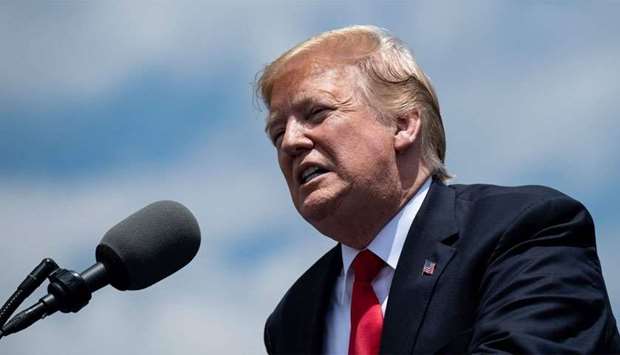* Mexican goods to be hit with 5% tariff, rising to 25%
* Move sends bad signal for global trade overall: strategist
* Global carmakers' shares fall as much as 7%
Shares of global automakers and suppliers tumbled on Friday after US President Donald Trump threatened to impose tariffs on imports from Mexico, potentially upending a global manufacturing business model established decades ago.
From Mazda in Japan to Volkswagen in Germany to General Motors in the United States, carmaker stocks took a hit as a new front opened in the global trade war.
Railing against a surge of illegal immigrants across the United States' southern border, Trump said he would target all goods coming from Mexico with a 5% tariff from June 10, increasing monthly to 25% by Oct. 1, unless Mexico took immediate action.
‘In order not to pay Tariffs, if they start rising, companies will leave Mexico, which has taken 30% of our Auto Industry, and come back home to the USA,’ Trump said in a Tweet on Friday.
For years carmakers have built vehicles in Mexico, taking advantage of its cheap labour, trade deals and proximity to the United States, the world's largest auto market after China.
The move could hit a number of global companies, with the auto industry looking particularly vulnerable, along with aerospace suppliers, industrial component makers and electronics firms.
‘This being escalated at a time when the China situation is not still resolved shows that Trump views tariffs as a weapon he can use without damage to the US economy. That's worrying and sends a bad signal for the outlook for global trade overall,’ said Jon Harrison, a senior macro strategist at TS Lombard.
The latest threat to impose tariffs on millions of vehicles bound for the United States comes two weeks after Trump announced he would delay a decision on imposing up to 25% tariffs on vehicles from the European Union and Japan by up to six months.
TRADE FLOWS
Automakers shipped $52.6 billion worth of vehicles to the United States from Mexican assembly plants in 2018. Another $32.5 billion in auto parts flowed to the US from Mexican factories, according to US Commerce department data.
The American Automotive Policy Council, which represents US automakers in Washington D.C., said new tariffs would ruin the benefits of Trump's proposed new trade agreement with Mexico and Canada, which relies on duty-free access.
‘The imposition of tariffs against Mexico will undermine its positive impact and would impose significant cost on the US auto industry,’ it said in a statement.
Some of the most popular vehicles sold in the United States are made in Mexico, including versions of General Motors' Chevrolet Silverado pickup, the Chevrolet Blazer SUV, Volkswagen's Jetta sedan and the Toyota Tacoma pickup.
The move also looks also likely to backfire on US consumers, driving up the prices of goods as varied as cars, refrigerators and television sets.
‘Margins are so thin in the US market right now that there's no way that any automaker is not going to pass on these tariffs to their customers,’ said Janet Lewis, an analyst at Macquarie Securities.
‘The unknown factor is the impact on suppliers, as components can move back and forth between Mexico, the United States and Canada up to 20 times before they make their way into assembled cars.’
Swedish industrial seals and bearings maker SKF, which supplies carmakers in the United States from Mexico, said it would pass on any tariff impact to customers.
SHARE IMPACT
In Japan, shares in Toyota fell 3% while Nissan dropped 5% and Honda 4%. Mazda took a bigger hit, tumbling 7%. All four operate vehicle assembly plants in Mexico, producing roughly one-third of the vehicles made there.
In Europe, potential merger candidates Fiat Chrysler and Renault led the carmakers lower, each falling 5%, while automotive supplier Faurecia was down 4% in late afternoon trading.
Shares in Madrid-listed bank BBVA and Italian steel pipe maker Tenaris, both with significant exposure to Mexico, each fell 4%, while Mexican-focused exchange-traded funds reeled.
US stocks opened sharply lower, with GM and Ford both falling 4% in early trading, while car parts maker Delphi dropped by 6%.

